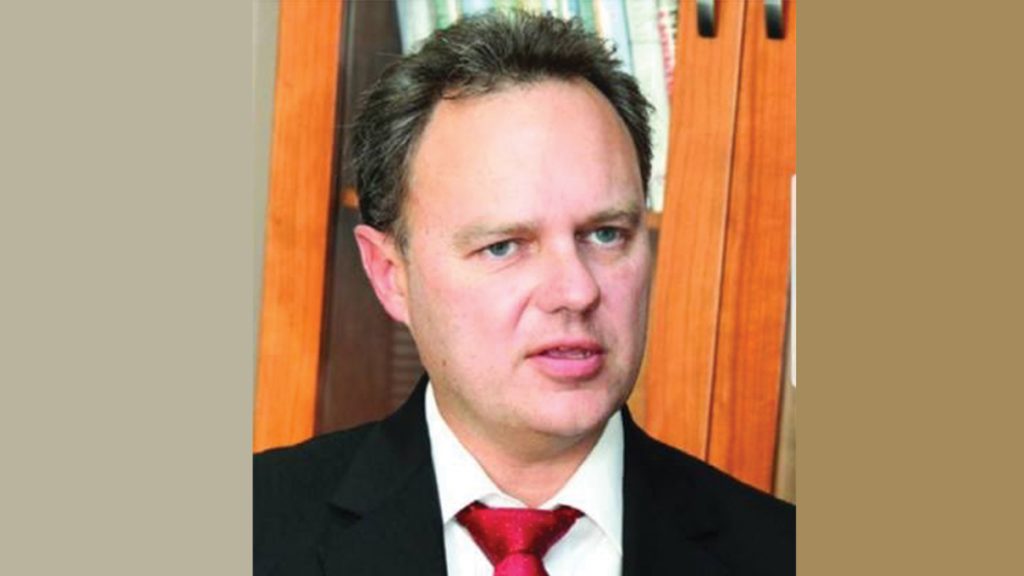CoA reverses Marsland, Okaile acquittal
DPP to reinstate money laundering, obtaining by false pretences charges
STAFF WRITER
editors@thepatriot.co.bw
Directors of liquidated controversial assest management firm, Capital Management Botswana (CMB) Rapula Okaile and Timothy Marsland suffered a major setback in their quest for freedom midweek, when a full bench of the Court of Appeal (CoA) reversed their acquittal and discharge by the high court.
The duo are facing multiple charges of obtaining by false pretences and laundering for funds amounting to P477 million sourced from Botswana Public Officers Pension Fund (BPOPF) through a local private equity arrangement/ portfolio known as the Botswana Opportunities Partnership (BOP).
The Court of Appeal (CoA) bench led by Judge Isaac Lesetedi upheld an appeal by the state over an earlier acquital granted in a review application launched by the duo before High Court Judge Boipuso Tshweneyagae in August 2021. In the review application, marsland and Okaile argued that the charge sheet alleging money laundering activities or obtained by false pretences on their part arose out of the misunderstanding by the Director of Public Prosecutions (DPP) and Attorney General, of the Private Equity Investment (PEI) entered between CMB and BPOPF.
Marsland, was arrested on an Interpol red alert issued at the instance of three warrants of arrest from Botswana in July 2019. The warrants were issued at the instance of the DPP on reasonable grounds of suspicion that he had on different dates committed offences of obtaining by false pretences and money laundering. He was jointly charged with Okaile and CMB, a company they owned and controlled and CMB Fund 1. Marsland has been resisting his extradition to Botswana and the extradition proceedings are still pending. The origin of the criminal charges was an en commandite (limited partnership) agreement entered into between CMB and BPOPF in November 2014. “The salient features of that agreement were that CMB and Fund entered into a partnership in terms of which the Fund was to contribute 99% of the funds to be invested and CMB the remaining 1%. Those funds were to be invested in identified private equities,” said Judge Lesetedi.
Acting on a complaint that CMB through its directors had fraudulently diverted and squandered some of the said funds to other uses or for personal use, a criminal investigation was launched by the Directorate on Corruption and Economic Crime (DCEC). The investigations led to the issuance of the warrants of arrest and the subsequent events. In May 2021, Marsland and Okaile filed review application before Justice Tshweneyagae.
Justice Lesetedi said to the extent that the High Court believed that the presence of a written agreement and the issuance of share certificates evidenced legitimate investments or transactions, judicial experience in cases involving sophisticated white collar crimes shows that purported contracts or corporate status are often used either to facilitate or cloak the commission of crime in ostensible legitimacy. “To uncover presence of criminal conduct, forensic investigations usually have to go behind these documents to piece together patterns and acts of criminality. It will therefore be for the DPP at trial, if and when the charged persons are brought to trial, to unravel the alleged web to prove the commission of the crime through both oral and documentary evidence with relevant witnesses explaining the money and paper trail and the rules and conventions, in this case, of private equity management under en commandite arrangements,” he said.
Justice Lesetedi said a court in motion proceedings does not have the tools to readily gainsay the findings and opinions of the investigators and witnesses in specialised fields such as pension fund and other asset management when such findings and opinions are still liable to be subject of court scrutiny with a more penetrating probe. In any event the High Court seemed to have ignored witness statements from informed witnesses who were highly involved in the dealings with the respondents notwithstanding that such statements were highly incriminatory of the respondent in criminal wrongdoing whichever way one looks at it, the respondents did not make out a case for judicial review.
